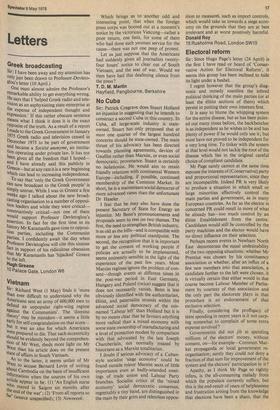Greek broadcasting Sir: ' have been away and my attention has
Only just been drawn to Professor Devletoglou's letter (10 April.) One must almost admire the Professor's remarkable ability to get everything wrong. He Says that I `helped Greek radio and television as an asphyxiating state enterprise at the expense of independent thought and expression.' If this rather obscure sentence means what I think it does it is the exact oPPosite of the truth. As a result of a report I made to the Greek Government in January 1975 Greek radio and television ceased in December 1975 to be part of government a.nd became a Societe anonyme, an institution operating under private law. It has not been given all the freedom that I hoped—. and I have already said this publicly in Greece—but at any rate it is a new beginning which can lead to increasing independence. To say that 'only the Greek Government en now broadcast to the Greek people' is siniPly untrue. While I was in Greece a few Wks ago I talked about the new broadcasting organisation to a number of opposition leaders and while they were critical— constructively critical—not one of them would support Professor Devletoglou's assertion. In fact for the first time in its history Mr Karamanlis gave time to opposition parties, including the Communist Parties. I confidently await the day when Professor Devletoglou will cite this sinister fact in support of his ridiculous obsession that Mr Karamanlis has `hijacked' Greece to the left.
Hugh Greene
10 Palace Gate, London W8


































 Previous page
Previous page